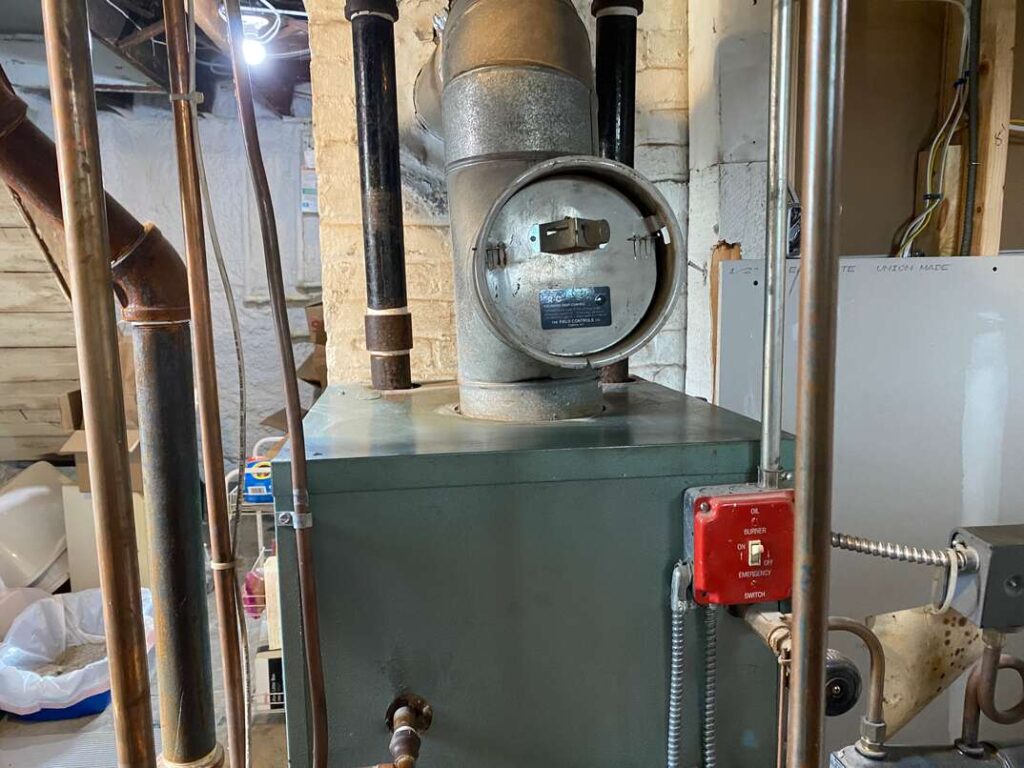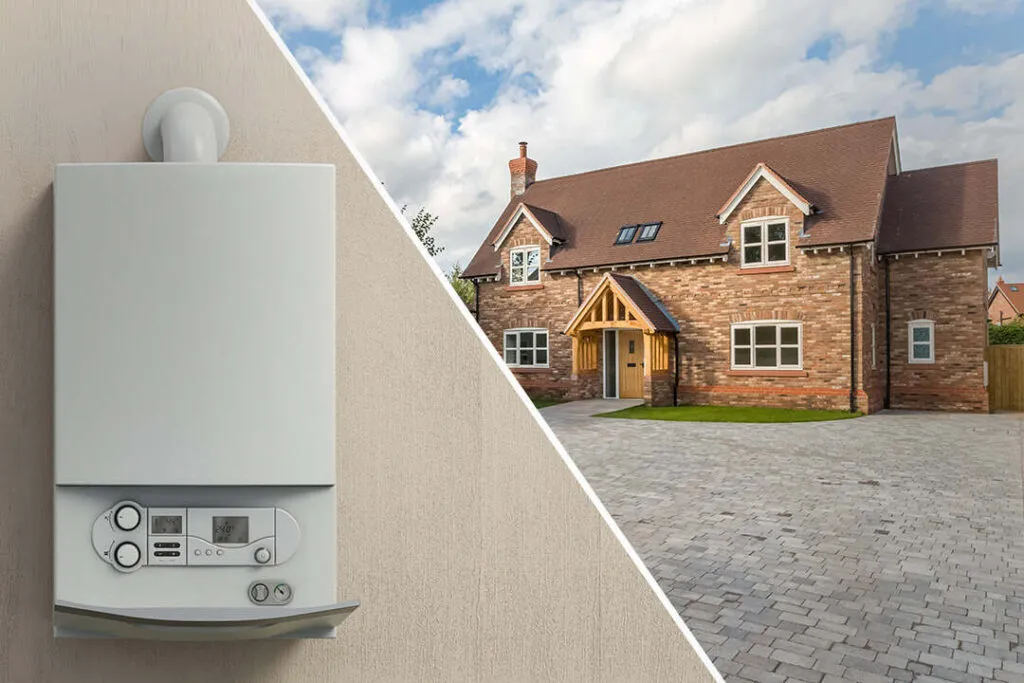Choosing the right boiler for your home isn’t just about heat, it’s about comfort, efficiency, and long-term savings.
From combi units that give you hot water on demand to system and conventional boilers built for larger households, each option serves a different lifestyle. Here’s what you need to know before deciding.
What kind of boiler is used for residential installations?
Homes typically use combi, system, regular, or electric boilers, with condensing technology now standard for efficiency.
Key Takeaways
- Combi boilers: best for small homes, space-saving, hot water on demand.
- System boilers: ideal for families, support multiple bathrooms.
- Regular boilers: suited for older homes with existing tanks.
- Electric boilers: option for homes without gas supply.
- Condensing tech: standard in modern boilers for efficiency.
- Choose based on home size, water use, budget, and energy needs.
What Is a Residential Boiler?

A residential boiler works like the heating engine of your home. Rather than blowing hot air like a furnace, it heats water and circulates it through pipes or radiators. And if it ever stops working properly, knowing who to call for boiler repair can save you from long, chilly nights.
That hot water or steam keeps your rooms cozy, especially in colder months. The setup is efficient, reliable, and a solid flex if you like steady, even heat without the dryness of forced air systems, and if you ever need boiler repair in West Greenwich, keeping that comfort running smoothly is just a call away.
Key Factors to Consider Before Choosing a Boiler
First up, think about your home’s size and how much hot water you actually use. A small flat and a busy family home don’t need the same setup.
Energy efficiency matters too. Go for a system that won’t wreck your utility bills and keeps your carbon footprint in check.
Space is another big one. Combi boilers save room since they don’t need a tank, while system or regular boilers need more space but handle higher demand.
Lastly, think about your budget and installation costs. Spending a little more upfront can save you from constant fixes and callouts later. If issues ever do arise, having trusted options for boiler repair in Warwick ensures your comfort investment stays protected.
Main Types of Boilers for Residential Use
Combi Boilers
Think of a combi boiler as the multitasker. It heats your water and powers your central heating, all from one compact unit. No tanks, no fuss.
They’re perfect if you’ve got a smaller home or flat where space is premium real estate. Open the tap, and hot water flows instantly, so you don’t need to store it ahead of time.
The catch? If two showers run at once, it can struggle to keep up. Great for singles, couples, or small families, but not built for an army of morning showers.
System Boilers
System boilers bring in a little backup. They store hot water in a cylinder, so you’ve always got a reserve ready. Unlike regular boilers, most of the parts are built-in, which saves space compared to the old-school setups.
They’re a smart choice if your home has multiple bathrooms since everyone can enjoy a hot shower without battling low water flow. Just keep in mind, beyond checking space for the storage tank, you’ll also want to know what should boiler pressure be to keep the system running smoothly.
Think of them like the reliable family wagon, lots of storage, plenty of comfort, but a little extra space taken up in the driveway. Just like knowing what pressure should combi boiler be when heating is on keeps your system running right, it’s about balancing performance with practicality.
Regular (Conventional) Boilers
This is the granddad of boilers. A regular boiler uses both a hot water cylinder and a cold water storage tank. They’re bulkier but make sense if your house already has that system in place.
They shine in big homes with high water demand. If you’ve got three showers, a dishwasher, and laundry going at the same time, a regular boiler won’t blink.
But for modern homes without loft space, it’s like asking why does my new boiler keep losing pressure; it simply doesn’t fit the setup. Too much equipment, not enough room.
Electric Boilers
If your home doesn’t have a gas line, don’t worry. Instead of installing a new gas boiler, you can opt for an electric model. These systems are compact, quiet, and work perfectly without a flue or chimney.
For apartments or homes off the gas grid, this can be the clean and easy choice. However, because electricity costs more to run, your bills may end up higher than with gas—especially if you’re not already familiar with basic upkeep tasks like how to clean a furnace, which can influence overall efficiency and operating costs.
They’re like the sleek city scooter, low maintenance, stylish, but not the cheapest ride for long hauls.
Condensing Boilers
Here’s where efficiency gets a glow-up. Condensing boilers capture heat that would usually escape through the flue and reuse it. That means lower energy bills and fewer emissions.
Almost all modern boilers are condensed by law, whether combi, system, or regular. If you’re upgrading, this is non-negotiable. It’s basically the standard, like Bluetooth in a new car.
Which One Fits You?
If you’re in a small space and don’t want tanks, a combi is your wingman. For bigger families with multiple bathrooms, system boilers hit the sweet spot. Got an older house with existing tanks? Stick with regular. And if you’re off-grid, electric has your back—just be sure to think about overall heating demands, similar to how people ask what size furnace do I need when choosing the right setup.
The real flex is picking what fits your lifestyle, not just your floor plan. Boilers might not be glamorous, but choosing the right one—or booking an expert boiler service in Providence—keeps your home running smoother, warmer, and more cost-efficient.
Energy Efficiency and Environmental Impact
Modern boilers aren’t just about heat, they’re about saving energy too. Condensing boilers, for example, squeeze more warmth out of every drop of fuel, meaning lower bills for you.
On the eco side, high-efficiency models cut carbon emissions without cutting comfort. When you understand how does a furnace work and pair one with smart controls, you’re not just heating your home — you’re embracing greener living without losing any style points.
Cost Breakdown: Installation & Running Costs
Boiler costs aren’t just about the sticker price. Installation can run anywhere from a quick-fit swap to a full system overhaul, and that’s where the bill stretches.
Once it’s installed, the real savings show up on your monthly energy tab. And if you’re wondering who takes care of removing my old boiler during replacement?, most services handle that too. Choose the right size and type, and you’re locking in steady comfort without bleeding cash long-term.
Which Boiler Is Best for Different Homes?

Small flats usually win with a combi boiler since it saves space and delivers hot water on demand. For bigger family homes with multiple bathrooms, a system boiler tends to perform better, especially when proper maintenance of boiler systems ensures consistent water pressure and long-term efficiency.
Traditional boilers still flex in older houses with existing tank setups, keeping heating smooth without a full system overhaul. If you’re weighing options, it helps to know what is the cost of a combi boiler so you can compare efficiency and long-term savings against traditional systems.
Frequently Asked Questions
1. What’s the best type of boiler for a small home?
Combi boilers are the go-to. They’re compact, no water tank needed, and heat water on demand.
2. Do boilers need a lot of upkeep?
Not really. A yearly service keeps things smooth, avoids breakdowns, and extends lifespan.
3. Gas or electric—what’s smarter?
Gas is cheaper to run long-term, but electricity wins for smaller spaces or homes without gas lines.
Conclusion
Picking the right boiler for your home isn’t about flexing fancy tech, it’s about comfort and efficiency that fits your setup.
Combi boilers are the all-rounders, system boilers handle bigger households, and regular boilers keep the old-school crew happy. The move? Match your boiler to your lifestyle and space, not just the hype.
Do that, and you’ll stay warm, save cash, and avoid heating headaches.